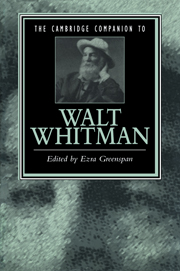Book contents
- Frontmatter
- 1 Introduction
- 2 “As If I Were With You”
- 3 Fratricide and Brotherly Love
- 4 Reading Whitman’s Postwar Poetry
- 5 Politics and Poetry
- 6 Some Remarks on the Poetics of “Participle-Loving Whitman”
- 7 “Being a Woman ... I Wish to Give My Own View”
- 8 Appearing in Print
- 9 “I Sing the Body Electric”
- 10 Walt Whitman
- 11 Borge's "Song of Myself"
- Suggestions for further reading
- Index
- Series List
2 - “As If I Were With You”
Published online by Cambridge University Press: 28 May 2006
- Frontmatter
- 1 Introduction
- 2 “As If I Were With You”
- 3 Fratricide and Brotherly Love
- 4 Reading Whitman’s Postwar Poetry
- 5 Politics and Poetry
- 6 Some Remarks on the Poetics of “Participle-Loving Whitman”
- 7 “Being a Woman ... I Wish to Give My Own View”
- 8 Appearing in Print
- 9 “I Sing the Body Electric”
- 10 Walt Whitman
- 11 Borge's "Song of Myself"
- Suggestions for further reading
- Index
- Series List
Summary
Every reader has noticed how often Walt Whitman says I. There are few pages of Leaves of Grass without at least some form of the first-person pronoun - I, me, mine, my, myself. Nor is there any hint of an apology in his acknowledgment of this fact: “I know perfectly well my own egotism . . . and cannot say any less.” Yet I is not the pronoun that most markedly distinguishes Whitman's poetry (as C. Carroll Hollis has calculated, for example, “on a percentage basis Dickinson uses even more”). You is. Whitman doesn't say you as often as he says I, but he does use the second-person pronoun more pervasively than any other major poet. Even the assertion of his own egotism that I've just quoted is embedded in a larger thought that reveals the interdependence of his authorial I and the you of his reader:
I know perfectly well my own egotism, And know my omnivorous words, and cannot say any less, And would fetch you whoever you are flush with myself.
To describe this awareness of and address to the reader, Hollis borrows a term from modern linguistics and calls it Whitman's “illocutionary” stance. Ezra Greenspan borrows a term from classical grammar and calls it Whitman's “vocative technique.” A more colloquial way to indicate the crucial place you occupies in many of Whitman's poems is to say that they are performances. Whitman put it still more colloquially when he wrote in a notebook: “All my poems do. All I write I write to arouse in you a great personality.” Of course, as performances they were enacted imaginatively rather than literally. Despite Whitman's fantasies about being a national orator, speaking from real stages to packed houses, he seldom performed in front of live audiences.
- Type
- Chapter
- Information
- The Cambridge Companion to Walt Whitman , pp. 7 - 26Publisher: Cambridge University PressPrint publication year: 1995
- 2
- Cited by

